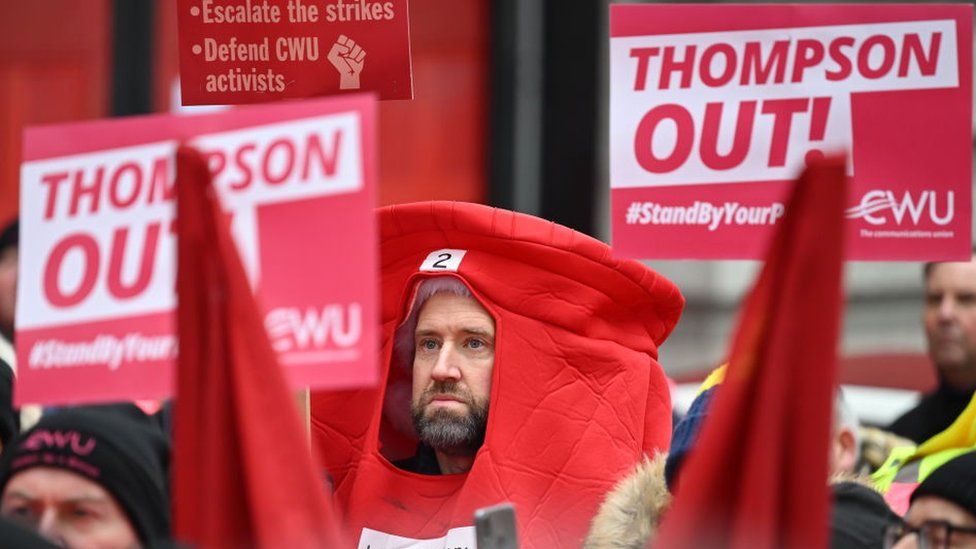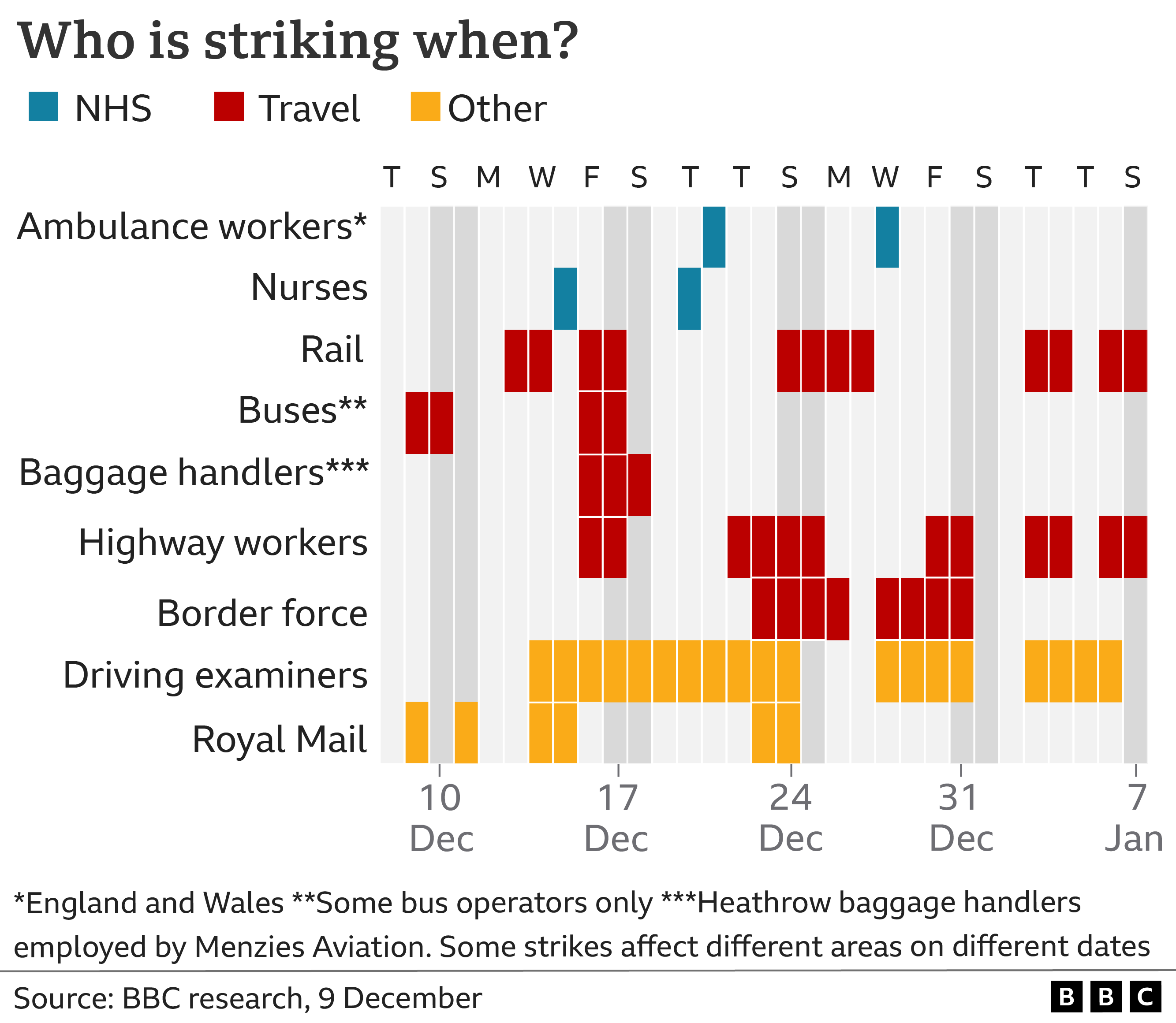
Thousands of postal workers at Royal Mail are on strike over pay and conditions, potentially causing disruption to customers' festive deliveries.
More than 115,000 staff walked out on Friday, with more strikes to follow in the run-up to Christmas.
Recent talks between the CWU union and Royal Mail have broken down.
Members of the union are expected to continue striking on Sunday as well as on 14, 15, 23 and 24 December.
Although there are no letter deliveries on Sundays, there are parcel deliveries, and Royal Mail also processes mail on a Sunday for delivery on a Monday.
Last week, Royal Mail advised people to post Christmas mail earlier than usual due to the strikes.
Millions of letters have reportedly been piling up as negotiations have stalled, while it has brought forward the final suggested date for sending second class post to 12 December from 19 December, and for first class to 16 December from 21 December.
The union has said staff want a pay rise that matches the soaring cost of living and has accused management of trying to "force through thousands of compulsory redundancies".
Workers carrying placards demanding the removal of Royal Mail's chief executive Simon Thompson gathered outside the Mount Pleasant Mail Centre in London - the company's largest sorting site in the UK.
One employee Nick, who has worked for Royal Mail for 38 years, told the BBC that although he had walked out during previous strikes, the distance between management and unions appeared to him to be wider in this wave of industrial action.
"It seems to me there's not really a negotiation. It is a take it or leave it deal where they are attacking our terms and conditions."
Inside the sorting office, parcels and letters continued to be sorted by a skeleton crew of 100 people, compared to the 1,000 employees who normally work at the centre.
Joy, who has been with Royal Mail for 28 years, told the BBC he had chosen to come to work on a strike day because "I want to please my customers because of the peak time".
He said that firms are worried about business after the height of the Covid pandemic. "They need their letters and their mail ASAP," he said."I want to keep moving the mail."
Members of the CWU will also stage a rally on Friday afternoon outside Parliament in central London.
Speaking during a visit to an RAF base in Lincolnshire, Prime Minister Rishi Sunak said that he is not ruling out extending "tough" new anti-strike laws to prevent walkouts by emergency service workers.
He said the government is "looking at all options" when asked about the potential changes to the law to limit the impact of strikes, but did not give any further details.
The most recent dispute in the postal industry began this summer after Royal Mail rejected union demands for a pay rise that matched inflation - the rate at which prices rise - which is currently 11.1%.
Royal Mail has been struggling as it moves from its traditional business of delivering letters, which is no longer profitable, to the fast-growing world of parcel deliveries.
It wants to cut 10,000 jobs by next August, which will include 6,000 redundancies. It also argues thatit needs to modernise how the business works to accommodate a rise in parcel deliveries and the continued decline in letter volumes, which would mean changing workers' hours.

Dave Ward, the CWU general secretary, said: "Royal Mail bosses are risking a Christmas meltdown because of their stubborn refusal to treat their employees with respect.
"Postal workers want to get on with serving the communities they belong to, delivering Christmas gifts and tackling the backlog from recent weeks.
"But they know their value, and they will not meekly accept the casualisation of their jobs, the destruction of their conditions and the impoverishment of their families."
Talks have broken down between the union and Royal Mail, a spokesman said, adding that Royal Mail managers are "refusing to budge with their 'best and final' offer".
That offer includes a 9% pay deal over 18 months and "a number of other concessions to terms and agreements", Royal Mail said.
A company spokesman said: "We spent three more days at [conciliation service] Acas this week to discuss what needs to happen for the strikes to be lifted.
"In the end, all we received was another request for more pay, without the changes needed to fund the pay offer," he said, adding that the union "knows full well" that the business is losing more than £1m a day.

Have you been affected by the issues raised in this story? Share your experiences by emailing haveyoursay@bbc.co.uk.
Please include a contact number if you are willing to speak to a BBC journalist. You can also get in touch in the following ways:
- WhatsApp: +44 7756 165803
- Tweet: @BBC_HaveYourSay
- Upload pictures or video
- Please read our terms & conditions and privacy policy
If you are reading this page and can't see the form you will need to visit the mobile version of the BBC website to submit your question or comment or you can email us at HaveYourSay@bbc.co.uk. Please include your name, age and location with any submission.
https://news.google.com/__i/rss/rd/articles/CBMiKmh0dHBzOi8vd3d3LmJiYy5jb20vbmV3cy9idXNpbmVzcy02MzkwMzQ4ONIBLmh0dHBzOi8vd3d3LmJiYy5jb20vbmV3cy9idXNpbmVzcy02MzkwMzQ4OC5hbXA?oc=5
2022-12-09 11:44:41Z
1690067507
Tidak ada komentar:
Posting Komentar